Abstract
The inevitable digitalization of the economy changes the working conditions and requires the presence of new labour functions for company employees who, in a highly competitive environment, need to confirm their qualifications and improve their professionalism, while adapting to the ongoing changes in the external environment. The article analyses the main directions of the activity of the councils for professional qualifications in the training of professional staff for the modern economy. It is proved that an independent assessment of qualifications is a tool that helps educational organizations to update, design and implement educational programs in connection with what helps educational organizations to identify their weaknesses in the training of professional staff and formulate recommendations for improving the quality of their work. The author's interpretation of the term "digital competence" is presented, the possession of which in the current conditions of the formation of the digital economy is an integral part of the confirmation of professionalism and competitiveness of the staff, and therefore the professional qualifications councils actively update the professional standards. The research used methods of comparative analysis, theoretical modelling, as well as empirical studies obtained during the independent assessment of qualifications. For the methodological basis of the study there were used the results of monitoring labour market at the regional level and forecasting the demand for the new types of job occupations in the labour market.
Keywords: Professional stafflabour productivityqualifications systemprofessional standardsdigital competence
Introduction
Globalization processes and the active development of innovative technologies in this period are the most significant factors that influence the activities of modern organizations and form new challenges for maintaining their competitiveness. Insufficient development of qualification requirements in many professions in the domestic economy negatively affects labour productivity and requires prompt resolution. In this regard, the employers need new professional standards that will contain modern requirements for employees and their qualifications, and the employers are also interested in the real tools for independent assessment of the quality of applicants for work. Educational organizations in their turn, need methodical recommendations to change the approach to the design of educational programs in accordance with the modern requirements of the labour market.
Problem Statement
Insufficient competition in the economy, technological backwardness, a low level of knowledge not only among workers but also among company managers regarding modern requirements for professional qualification and methods of responding to external challenges are the incomplete list of reasons for the decline in labour productivity that is being observed over an extended period of time in our country. This problem was noted at the meeting of the Presidium of the Council for Strategic Development and Priority Projects in 2017 by the Chairman of the Government of the Russian Federation D.A. Medvedev and as a result the problem demanded the adoption of measures to address it.
Research Questions
The study of the development of the management system of organizations for the development of the economy are engaged in many authors (Trachuk & Linder, 2018; Ashmarina, Zotova, & Smolina, 2016; Belyaeva, Ermoshkina, Sukhinina, Starikova, & Pecherskaya, 2016). However, the problems of ensuring economic growth and, in particular, the growth of labour productivity require an integrated systematic approach to the solution, rather than the adoption of certain local regulations and the actions of individual institutions.
Purpose of the Study
The purpose of the study is to develop a methodological tool for the actualization and design of educational programs, which is formed within the councils on professional qualifications, acting as an integration platform for the representatives of the professional community and educational organizations interested in harmonizing requirements for the quality of education and the assessment system. The work includes the analyze the importance of an independent assessment of qualifications, which is one of the activities of the professional qualification councils, in the process of training professional personnel, taking into account the requirements of the labour market and the impact of the formation processes of the digital economy.
Research Methods
According to Rosstat, the labour productivity index in the national economy tends to decrease, which, according to the experts, is due not only to the market changes in the national economy but also to the low qualification of the employees, as well as the lack of awareness by the company leaders of the labour functions of the employees, which negatively affects the distribution of tasks and the selection of personnel for work (Figure
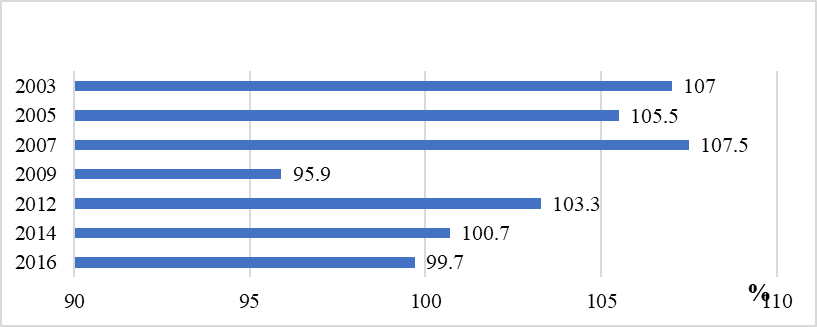
Source: www.rbc.ru, 2018
Russia, along with Chile, South Korea, Costa Rica, Mexico, Greece, according to data provided by the OECD, for several years has been among the five most working countries among the 37 leading economies in the world (Figure
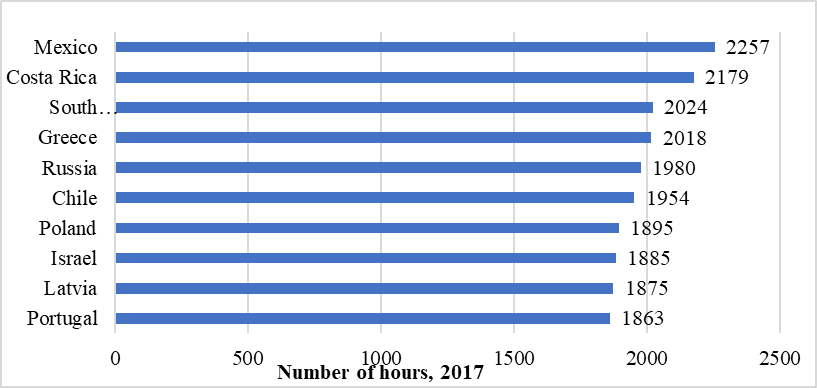
Source: www.rbc.ru, 2018
Indicative is the fact that the countries that lead in terms of quantity, that is, the number of hours worked per year, are outsiders in terms of "quality of work", namely in terms of earnings quality, which is understood as total hourly earnings, expressed in dollars and taking in consideration the degree of uniformity of income distribution among the population. In particular, Russia, as well as Latvia, Chile, Mexico, Costa Rica is on the last lines of the rating on hourly labour productivity, which indicates an extensive approach to the formation of national income and a low level of the use of modern innovative technologies in the workers' activities. In the leading economies of the world, such as Germany, Norway, Switzerland, with a fairly small number of working hours, hourly labour productivity is several times higher than in Russia.
Findings
The National System of Qualifications (NSQ), designed to develop tools to improve the quality of vocational and professional education and mechanisms for harmonizing the interests and requirements of employers and educational organizations (Shokhin, 2015; Brovchak, 2017), is a powerful engine for developing the labour market and raising labour productivity since it contributes to the solution of the following tasks:
defining professions and qualifications necessary for the development of the economy;
forecasting in the field of competences and qualifications;
analysis of current changes in the content of professional activities;
providing an opportunity for citizens to obtain a modern profession in demand for employers;
encouraging employers to use continuous development programs;
economic incentives for citizens to continually improve their skills, acquire new competencies.
The national system of qualifications unites different participants and, due to the active role of the sectoral councils, it coordinates the interests of employers, educational institutions, employees, job applicants, public authorities, qualification assessment centers and education quality assessment centers (Figure
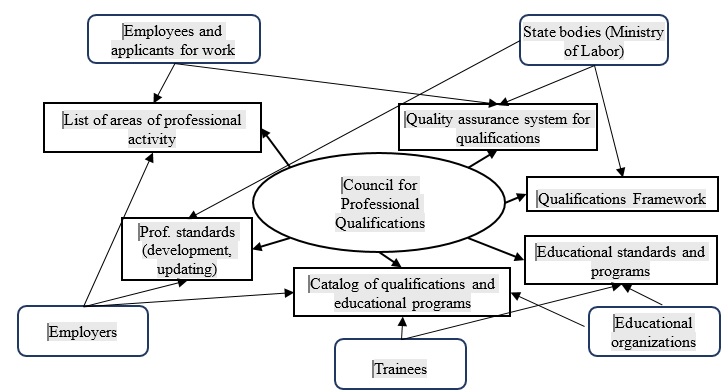
The spark for the development of the NSQ was the Decree of the President of the Russian Federation of 16.04.2014 No. 249 on the establishment of the National Council for Professional Qualifications under the President of the Russian Federation, which currently unites 31 sectoral councils for professional qualifications (Murychev, Mashtakeyeva, & Novikov, 2017). The development of the NSQ is facilitated by active work and building strong ties between the sectoral councils on professional qualifications (CPQ) and the professional community (Figure
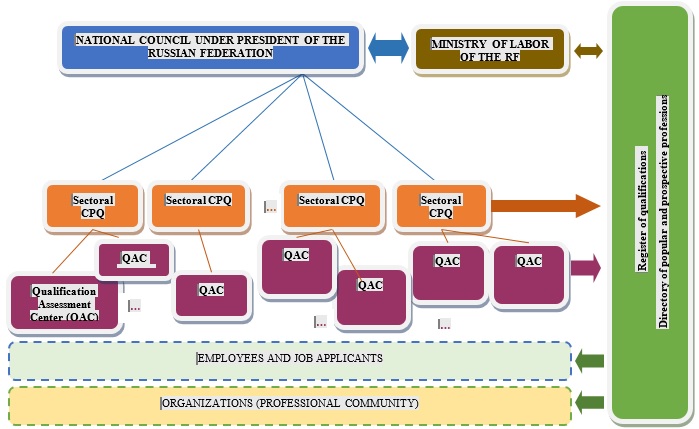
Councils for professional qualifications have a direct impact on the formation of professional staff for the modern economy (Figure
labour market monitoring, ensuring its needs for qualifications and vocational education;
development and updating of professional standards (PS) and qualification requirements;
examination of the federal state educational standards (FSES) for vocational education, exemplary basic professional educational programs and their projects, assessment of their compliance with professional standards, preparation of proposals for the improvement of these standards of vocational education and educational programs;
organization of professional and public accreditation of the basic professional educational programs, the basic programs of professional training and (or) additional professional programs
organization of an independent assessment of the qualifications of employees or persons applying for a certain type of work.
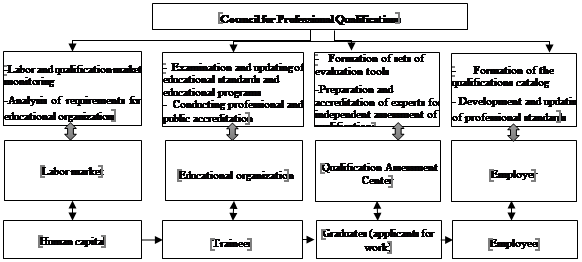
Each sectoral council, while developing professional standards, that include generalized labour functions and labour functions in the context of labour actions, the necessary knowledge and skills, considering the changes taking place in the economic environment, including in the field of digitalization, contributes to the construction of a clear system of requirements for workers, taking into account the current situation and the prospects for the development of the labour market (Tumanova & Isabekov, 2018). Confirmation of the employee's qualifications to the requirements set by the professional community, and the changes occurring in the external environment take place in the framework of an independent assessment of qualifications that involves (from 03.07.2016, No. 238-FL):
Identification of the correspondence between the professional competencies that are formed among the graduates of educational organizations, labour functions represented in the professional standard;
Conducting comparisons within the procedure of professional and public accreditation of the funds of evaluation tools of educational programs in educational organizations and sets of evaluation tools formed by centers for assessing qualifications in conjunction with the representatives of employers.
The identification of inconsistencies in the independent assessment of qualifications indicates a low quality of design and implementation of educational programs and the inability of the educational organization to train competitive professional staff. Thus, an independent assessment of qualifications is a real tool that, on the one hand, influences the formation of the professional market for certain types of professional activity, and on the other hand, it helps educational organizations to identify their weaknesses in the training of professional staff and formulate recommendations for improving the quality of educational programs implementation.
The priority of the development of the digital economy of the Russian Federation, in which data in digital form is the most important factor in the growth of labour productivity, inevitably affects the qualification requirements for the employees and job applicants and should be taken into account in the development of the professional standards (Shmelkova, 2016; Astafeva, 2018). Considering this, in accordance with the Program “The Digital Economy of the Russian Federation”, approved by the Chairman of the Government of the Russian Federation D.A. Medvedev (from July 28, 2017, No. 1632-р) within the framework of the updating of professional standards by sectoral CPQs, digital competencies are introduced. The authors of this article, with digital competencies, suggest to understand the skills of the activity in the corresponding form of professional activity on the basis of knowledge of the priority directions of the development of the technosphere and the skills to confidently apply infocommunication technologies in relevant professional activities, ensuring effective interaction of the professional community, representatives of the scientific and educational environment, the state, citizens and other members of the public.
Conclusion
Since the speed of changes in the external environment is increasing, new professional standards are continually emerging, and the existing ones are constantly being updated, and this encourages the educational organizations to quickly update the educational programs. The normative period for the mastering of educational programs for secondary specialized education, higher education and additional vocational education is greater than the life cycle of the professional standard, which is equal to three years. Designing and approving educational standards based on professional standards means fixing labour market requirements at the current time. In addition, the approval of the new and the actualization of the already existing professional standards implies the unambiguous introduction of changes in educational standards, which takes from 1 to 2 years. In addition, other elements of the national system, in particular qualifications singled out on the basis of the approved professional standards and sets of valuation tools developed on the basis of qualifications, also have a significant impact on the vocational education system, apart from professional standards. In this regard, the authors of this article believe that it is necessary to develop quality standards for training specialists according to the levels of training, that will create a full-fledged tool for improving the quality of design and implementation of educational programs. The algorithm for designing educational programs, laid down in the quality standard, will provide an opportunity for prompt response by educational organizations to the changes in the regulatory and methodological framework and the emergence of the new requirements for professional qualification and to formulate competencies for students that are necessary for the implementation of professional activities. Such an approach to the design of educational programs will allow us to highly evaluate the quality of their implementation and, most importantly, will allow them to train qualified personnel for the digital economy that correspond to modern challenges of the external environment.
Addressing the issues of ensuring economic growth requires the use of an integrated approach and the introduction of the new forms of cooperation between public authorities, employers and educational organizations in the formation of professional personnel within the national system of qualifications for the digital economy. The work concludes that due to the high dynamics of the external environment and the formation of the new requirements for the qualification of educational organizations it is rather difficult to design educational programs ensuring the conformity of the qualifications of their graduates to the requirements of the professional community. Therefore, as the next step in the development of the qualification system, the authors proposed the development of a quality standard for training specialists, that includes the algorithm for designing educational programs, which will enable educational organizations to react quickly to the emergence of the new requirements for professional qualifications.
References
- Ashmarina, S.I., Zotova, A.S., & Smolina, E.S. (2016). Implementation of financial sustainability in organizations through valuation of financial leverage effect in Russian practice of financial management. International Journal of Environmental and Science Education, 11(10), 3775-3782.
- Astafeva, O.V. (2018). The problems of training managerial personnel in the digital economy. The Problems of Theory and Practice of Management, 5, 134-141. [in Rus]
- Belyaeva, G.I., Ermoshkina, E.N., Sukhinina, V.V., Starikova, L.D., & Pecherskaya, E.P. (2016). The conceptual model of sustainable development of the rubal sector. International Journal of Environmental and Science Education, 11(14), 6853-6865.
- Brovchak, S.V. (2017). Development of qualifications of specialists in the field of public-private partnerships. Financial Life, 1, 10-17. [in Rus]
- Decree of the President of the Russian Federation of 16.04.2014 No. 249 on the establishment of the National Council for Professional Qualifications under the President of the Russian Federation.
- Murychev, A., Mashtakeyeva, D., & Novikov, P. (2017). Developing a System of Professional Competences in Russian Financial Market. Money and Credit, 8, 18-25. [in Rus]
- Shmelkova, L.V. (2016). Footage for the digital economy: a look into the future. Further Professional Education in the Country and the World, 8(30), 1-4. [in Rus]
- Shokhin, A.N. (2015). The level of application of standards is an indicator of the development of industry. Standards and Quality, 12, 4-9. [in Rus]
- The Federal law "On independent assessment of qualifications" from 03.07.2016 no. 238-FL. [in Rus]
- The program "Digital Economy of the Russian Federation". Approved by the Decree of the Government of the Russian Federation of July 28, 2017 no. 1632 р. [in Rus]
- Trachuk, A., & Linder, N. (2018). Innovation and performance: an empirical study of Russian industrial companies. International Journal of Innovation and Technology Management, 15(3).
- Tumanova, O., & Isabekov, M. (2018). The International Experience in Designing and Applying Professional Standards. Problems of Theory and Practice of Management, 6, 26-38. [in Rus].
Copyright information

This work is licensed under a Creative Commons Attribution-NonCommercial-NoDerivatives 4.0 International License.
About this article
Publication Date
20 March 2019
Article Doi
eBook ISBN
978-1-80296-056-3
Publisher
Future Academy
Volume
57
Print ISBN (optional)
-
Edition Number
1st Edition
Pages
1-1887
Subjects
Business, business ethics, social responsibility, innovation, ethical issues, scientific developments, technological developments
Cite this article as:
Astafeva, O., Mashtakeeva, D., & Osipova, I. (2019). Council For Professional Qualifications In The Staff Training For The Digital Economy. In V. Mantulenko (Ed.), Global Challenges and Prospects of the Modern Economic Development, vol 57. European Proceedings of Social and Behavioural Sciences (pp. 852-859). Future Academy. https://doi.org/10.15405/epsbs.2019.03.84

